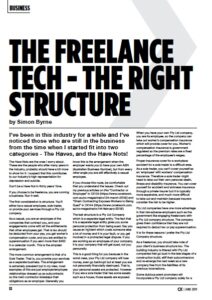News
24 Jun 2019
The Freelance Tech – The Right Structure

Subscribe to CX E-News
BUSINESS
The Freelance Tech – The Right Structure
by Simon Byrne.
I’ve been in this industry for a while and I’ve noticed those who are still in the business from the time when I started fit into two categories – The Haves, and the Have Nots!
The Have Nots are the ones I worry about. These are the people who after many years in the industry, probably should have a bit more to show for it. I suspect that this contributes to our industry’s high representation for depression and suicide.
Don’t be a Have Not in thirty years’ time. If you choose to be freelance, you are running a business. Run it well.
The first consideration is structure. You’ll either be a casual employee, sole trader, or provide your services through a Pty Ltd company. As a casual, you are an employee of the companies that contract you, and your engagements come with all the entitlements that other employees get.
That is, tax should be deducted from your pay, you get worker’s compensation cover, and you are entitled to superannuation if you earn more than $450 in a calendar month. This is the simplest arrangement.
The more common arrangement is that of a Sole Trader. That is, you provide your services as a separate business. The arrangement is extremely prevalent but in my view, most examples of this are just employer/employee relationships dressed up as subcontracts so the main contractor sidesteps their obligations as an employer.
Generally you know this is the arrangement when the employer wants you to have your own ABN
(Australian Business Number), but from every other angle you are still effectively a casual employee.
If you choose this route, be comfortable that you understand the issues. Check out my previous articles on this “Contractor or Employee” [link on this site or read in CX134] and “Sham Contracting Exposes Workers to Being Sued” [link on this site or read in CX144].
The last structure is a Pty Ltd Company which is a separate legal entity. The fact that it is a separate legal entity gives you some personal protection from being sued.
Say you cause an incident which costs someone else a lot of money and it is your fault, or you get involved in a protracted legal dispute. If you are working as an employee of your company, it is your company that will get sued, not you personally.
This is a good thing for you because in the worst case, your Pty Ltd company will lose money, even go bankrupt but at least you are not personally financially destroyed. That is, your personal assets are protected.
However if you are a sole trader that has some assets such as a house, those assets are exposed.
When you have your own Pty Ltd company, you are its employee, so the company can take out worker’s compensation insurance which will provide cover for you. Worker’s compensation insurance is government regulated so the premium rates are a fixed percentage of the employee’s wages.
Proper insurance cover for a workplace accident for a sole trader is a difficult area. As a sole trader, you can’t cover yourself as an ‘employee’ with workers’ compensation insurance. Therefore a sole trader might need to take out their own personal death, illness and disability insurance.
You can cover yourself for accident and sickness insurance through a private insurer but it is typically more expensive, and much more difficult to take out and maintain because insurers consider the risk to be higher.
Pty Ltd companies have one more advantage in that risk-adverse employers such as the government like engaging freelancers with a Pty Ltd company structure. The company gives them confidence that they are not required to deduct tax or pay superannuation. It is for these reasons I prefer the Pty Ltd Company structure.
As a freelancer, you should take note of your client’s business structure too. The building industry is littered with Pty Ltd companies that go bust in the late stages of a construction build, stiff their subcontractors and re-emerge the next week as a new company free from the liabilities of its previous incarnations.
Some dubious event promoters will incorporate a Pty Ltd company solely for a single event or tour.
As a subcontractor, this should raise an alert because it can mean the company has been created for the primary reason to limit liability, and that the company is unlikely to have any assets, combined with lots of obligations. This means the risk is higher that subcontractors might not get paid and the issue needs to be managed.
In those cases, request a deposit, because if they pay the deposit, it is a sign that they do in fact have financing in place, and if they subsequently go bust, you have not lost all of what you are owed.
Care about your superannuation. This will be very important to your later years.
In Australia, you have a wide choice over where you invest your hard-earned superannuation providing the funds comply. The difference between the retail superannuation funds and the industry fund’s performance can be dramatic.
It’s illegal for us to provide financial advice so I cannot make any recommendations. On a completely separate topic, have you seen those industry superannuation television ads that demonstrate consistently higher returns than the retail funds?
Chasing money – It is not up to you to fund your clients, and that is what is happening when they string your payment out. I only deal with clients that I consider as reasonable payers, and for me, the most that I consider reasonable is no more than thirty days after the month.
This might not work for you, and some would say that this is generous, but I work for a lot of large companies and government departments who are incapable of paying more quickly.
As long as I know the money is coming, I’m okay with it. However, I’ll never get to a point where a client owes me a very large amount of money, especially if I am incurring costs. On very large jobs where I crosshire people and equipment, I’ll insist on progress payments.
For my slow-paying clients, I may get them to pay a deposit too. Most of them are okay with this, as the slow payers are usually the large organisations that operate at a glacial pace. They are used to paying deposits and don’t expect you to fund their inefficiency. For the fast payers, I don’t worry about deposits. They are usually the nimble, small operators who realise that their subbies need to be paid promptly, otherwise those subbies might not be available the next time they call.
Having said all of this, I don’t let slow payment damage an otherwise good working relationship. We are a relationship business so if you are a freelancer that is known to be narky about getting paid, you are not going to get the calls.
In your career, a very small portion of your clients will fail to pay for various reasons. It happens. Learn from the experience and if there are reasonable (and legal) avenues to chase the money, by all means go for it! Other than that, learn from the experience and don’t lose any sleep over it.
Don’t go for the cheapest accountant. Good advice is invaluable so spend some time finding a good one, and be prepared to pay a reasonable fee. I spend a small fortune with my accountant every year, but the amount of money he has saved me, as well as the smart strategies he has got me to put in place, has made me dramatically more money than what I have paid out.
I hope this article will inspire the younger freelancer in the industry to take some steps which will make a dramatic difference to their financial situation in the future. The live event industry is inherently messy. Set yourself up in the right structure to ride the good times, as well as the bad, and put in place some routines to ensure that you build a great business.
As usual, this article is of general advice only and does not take into account your own circumstances – it might even be wrong for you! You should definitely get your own advice.
CX Magazine – June 2019 Entertainment technology news and issues for Australia and New Zealand – in print and free online www.cxnetwork.com.au
© CX Media
Related reading from Juliusmedia:
Employee or Contractor: Are YOU Sham Contracting?
Push out the Cowboys. Why we need ACCREDITATION
Paying for Contractor Compliance
Done an excellent gig – and they won’t pay you!
Sham Contracting Exposes Workers to Being Sued
Subscribe
Published monthly since 1991, our famous AV industry magazine is free for download or pay for print. Subscribers also receive CX News, our free weekly email with the latest industry news and jobs.







